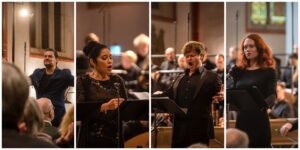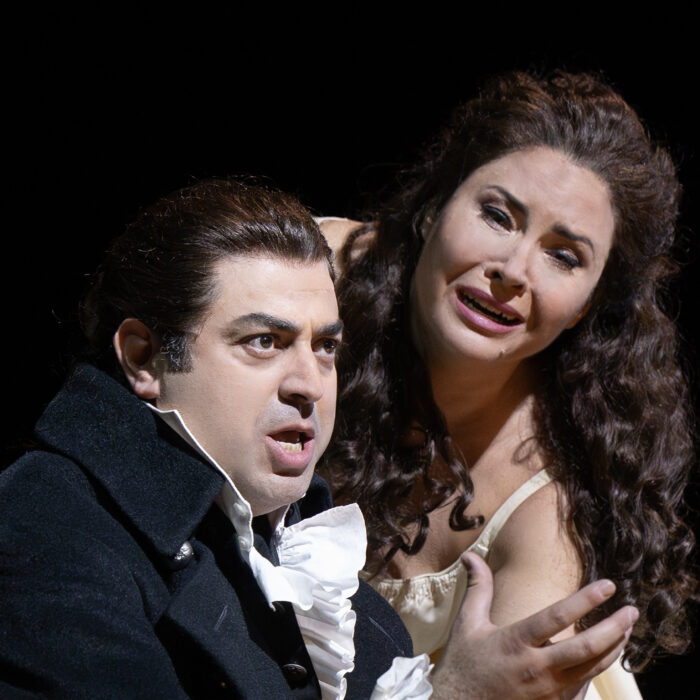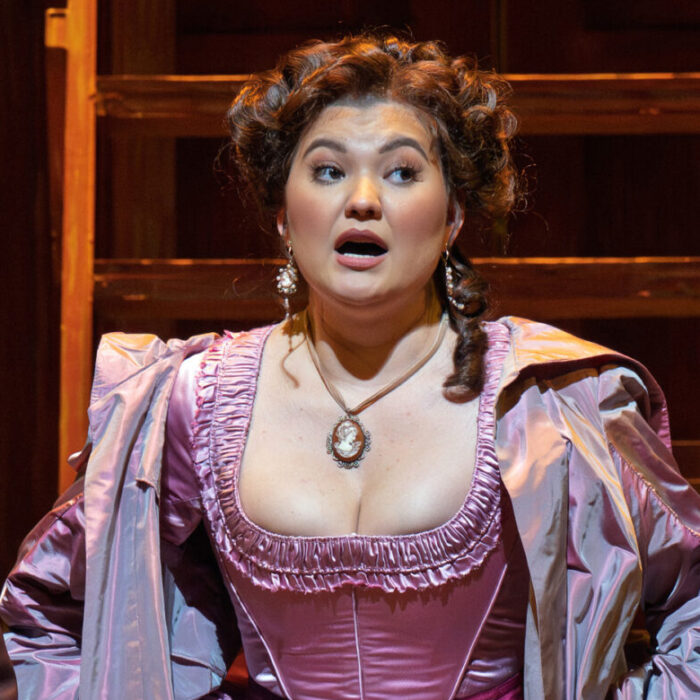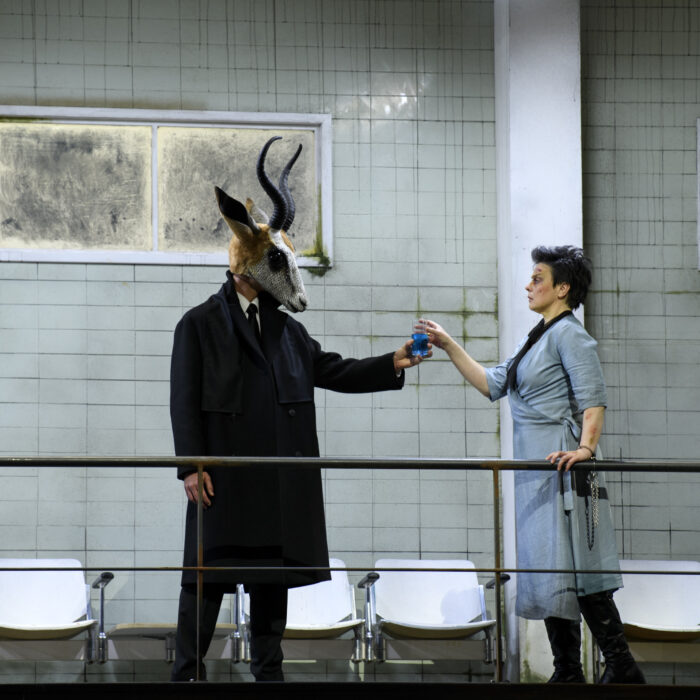
International Handel Festival, Göttingen 2023 Review: Hercules
A Star-Studded Cast Led By Petrou Opens Festival With A Success
By Alan Neilson(Photo: Alciro Theodoro da Silva)
Having survived the Reformation, allied bombing during World War Two and even an arson attack in 2005, Göttingen’s St. Johannis’ Church, which can trace its roots back to at least 1272, stands proudly overlooking the streets of the city’s historical centre. The current church, which dates back to the 14th century, has been added to and remodeled over the years, but retains its original, fortress-like appearance, especially the flat, unadorned, west-facing side, built of large, light-brown, roughly hewn stones and topped with two towers, which possess more intricate designs. The refurbished, modernized interior is bright, with the walls and ceilings of the apse painted white and reddish brown. Along with its pleasing acoustics, the Church of St. Johannis proved to be an excellent venue for the Handel Festival’s performance of the composer’s 1645 oratorio “Hercules.”
Handel wrote “Hercules” to a libretto by Thomas Broughton for the 1744-5 season at the King’s Theatre, London, which he presented alongside other oratorios, including his newly composed “Belshazzar’s Feast.” Unfortunately, for a variety of reasons, “Hercules” was not well-received and was given only two performances, although it was revived in 1749 and 1752 with significant cuts. It then struggled to establish itself through the 18th, 19th and 20th centuries, notching up only the occasional performance. Interestingly, however, Handel classed the work as a “music drama” rather than an oratorio, and recent revivals have seen numerous staged productions, which have been very well-received; many musicologists and commentators have drawn attention to the psychological depth of the characters and its dramatic vigor, which makes it ideal for staged performances. George Petrou, the festival’s artistic director, nevertheless opted for a concert presentation, yet such was the quality of the performances from all involved that it successfully captured the dramatic nature of the work and carefully revealed the psychological depths of the characters.
Hercules Overshadowed By The Female Roles
The work relates the death of Hercules, hence the title. However, the actual role of the character is a relatively small one; rather, it is the female characters of Dejanira and Iole who dominate the exchanges and whose characters are most clearly defined and developed. Hercules is certainly the fulcrum around which the drama plays out, but his actions are passive and reactive. It is the women who drive the narrative forward. It is Dejanira’s jealousy of Iole and her inability to accept that Hercules is not in love with Iole that ultimately result in Hercules’ death.
It is the relationship and the exchanges between the two that build the dramatic tensions, while those involving Hercules and Hyllus are of a lesser order, notwithstanding Hercules’ powerful Act 3 passage of accompanied recitative, ”Oh Jove! what land is this…” in which the hero rages and suffers as the poison courses through his veins. Even Lichas, the herald, is provided with more arias than either of the two male roles.
Genaux & Dennis Lead The Way With Quality Performances
The high-quality cast was led by mezzo-soprano Vivica Genaux in the role of Hercules wife, Dejanira, who, after a slowish start, produced a stunning performance that captured her character’s tormented soul. She despaired and suffered, celebrated and loved, fumed and raged as she let her jealousy take control, and descended into guilt and delirium as she realized that she was responsible for her husband’s death. Every aria and every line of recitative were brought fully alive in an expressively nuanced reading. Even her facial expressions were wonderfully communicative, as she reacted to the rest of the cast; Iole, in particular, bore the brunt of her vicious stares.
With such a variety of emotions on display, the role of Dejanira provides plenty of opportunities for singers to display their vocal versatility and interpretative abilities, and Genaux was happy to engage fully with the challenge. In her aria “There in myrtle shades reclined” she wove an intimate picture of her life to come, alongside Hercules, in Elysium, in which she poignantly captured her hopes for their blissful life together after death. Her nuanced handling of the vocal line, light coloratura and delicacy of expression pulled gently on the heartstrings of the audience in what was a beautiful rendition.
However, it was her adventurous third act passage of accompanied recitative “Where shall I fly?” followed by the aria “See the dreadful sisters rise” that really showed her quality. Having realized her fault in causing Hercules’ death, she rages at what she has done, and her mind runs wildly out of control. For the recitative, she employed dynamic accents and strong, colorful inflections and moved the voice violently, interspersed with calmer, delirious sections, expertly conjuring up her emotional instability and mental collapse, which she brilliantly built upon in the aria as the contrasts between wild outbursts and delirious callings became more extreme. Her lively coloratura, adventurous ornamentation and staccato delivery of the line created a powerful forward momentum, occasionally sidetracked by quiet, calm, sensitive sections in which the voice was given a hollow, otherworldly quality.
Soprano Anna Dennis produced an expertly conceived rendition of Iole, one that promoted the contrasts with Dejanira and, in the process, magnified both characters’ personalities. As opposed to Dejanira’s jealousy, manipulations and emotional swings, Dennis’ Iole was open, loyal and honest, with a desire to see the best in people. Not only was this clearly presented vocally through her open, pleasing and inviting lyrical appeal, but her calm, sympathetic stage presence added to the impression, which was perfectly highlighted in the duet “Joys of freedom.” Her voice possesses a luminescent quality with varying degrees of brightness. It is resonant, clear and beautifully balanced, which she showed off delightfully in the aria “How blest the maid,” which also highlighted the ease with which she is able to move the voice. It was also an expressively strong performance.
In the final act, Dejanira is still raging at Iole, blaming her for Hercules death, to which she responds with the aria “My breast with tender pity swells,” in which Dennis sensitively imbued the vocal lines with a gentle sympathy, while showing off her fine legato and sensitive phrasing. She created a very different impression with her Act two aria “Ah! think what ills the jealous prove” in which she muses on the effects of a jealous heart, which allowed her to display the quality of her coloratura, trills and detailed embellishments in a more expressively urgent piece.
Bass-baritone Andreas Wolf proved to be an excellent choice for the role of Hercules. He possesses a confident manner with a vibrant, resonant voice that easily dominates, which gives him the necessary authority and substance to convince in the role of a hero. His opening aria, “The god of battle quits the bloody field,” highlighted his vocal flexibility, pleasing timbre, clear articulation and ability to fill the space with his voice, but it was his ability to develop recitatives that most impressed, which were always dramatically and emotionally well set. The accompanied recitative, “Oh Jove! what land is this?” in which he rages as the pain of the deadly poison consumes his body, was exceptionally well crafted; the suffering and anger were clearly etched in his voice.
Sutor-Wernich Plumbs the Depths Of Her Lower Register
Alto Lena Sutor-Wernich created a strong impression in the role of Lichas, the herald. Although a subsidiary role in terms of the action, Handel provided the character with a generous number of arias, for which Sutor-Wernich took full advantage to show off her extraordinary dark-colored palette and her ability to imbue the vocal line with clearly-crafted emotion. In her opening aria, “No longer, fate, relentless frown,” she captured the attention with her dark tones and precisely articulated lines; the shades of dark coloring she was able to conjure were truly spellbinding; there was even a gravely quality to the voice as it trawled the lower register.
The aria “Oh scene of unexampled woe,” in which Lichas reflects on Hercules’ forthcoming death, was given a mournful rendition in which she created a dark vocal tapestry, occasionally contrasted with bright inflections that briefly altered the impression like lightening shooting across a black sky, in what was a moving farewell to the hero.
Tenor Nick Pritchard made for an honest, loyal and steadfast Hyllus in what was an emotionally refined and elegant presentation. Although the role offers little in the way of interest compared to the others, dwarfed as he is by the women and by Hercules, he still managed to make a good impression with a sensitive performance pleasingly moulded to fit his character. His singing was clear, articulate and precise throughout.
The NDR Vokalensemble, under the direction of chorus master Klaas-Jan de Groot, was in good voice throughout the performance, working in close harmony with the orchestra to bring out the wonderful variations in Handel’s choral writing. The dynamics were nicely managed to heighten the dramatic impact.
George Petrou produced a brisk, energetic reading from the FestspielOrchester, Göttingen, which added to the work’s dramatic tension and created pleasing, vibrant rhythmic variations that added to the momentum, while the balance within the orchestra was neatly maintained to allow the full textural qualities to be revealed.
Overall, this was an excellent concert performance that successfully engaged with the dramatic nature of the piece, to the extent that it even made a strong case for a staged production. It also proved itself to be the perfect work for opening the 2023 Göttingen Handel Festival; one left the church enthusiastically looking forward to the following evening’s production of “Semele.”



